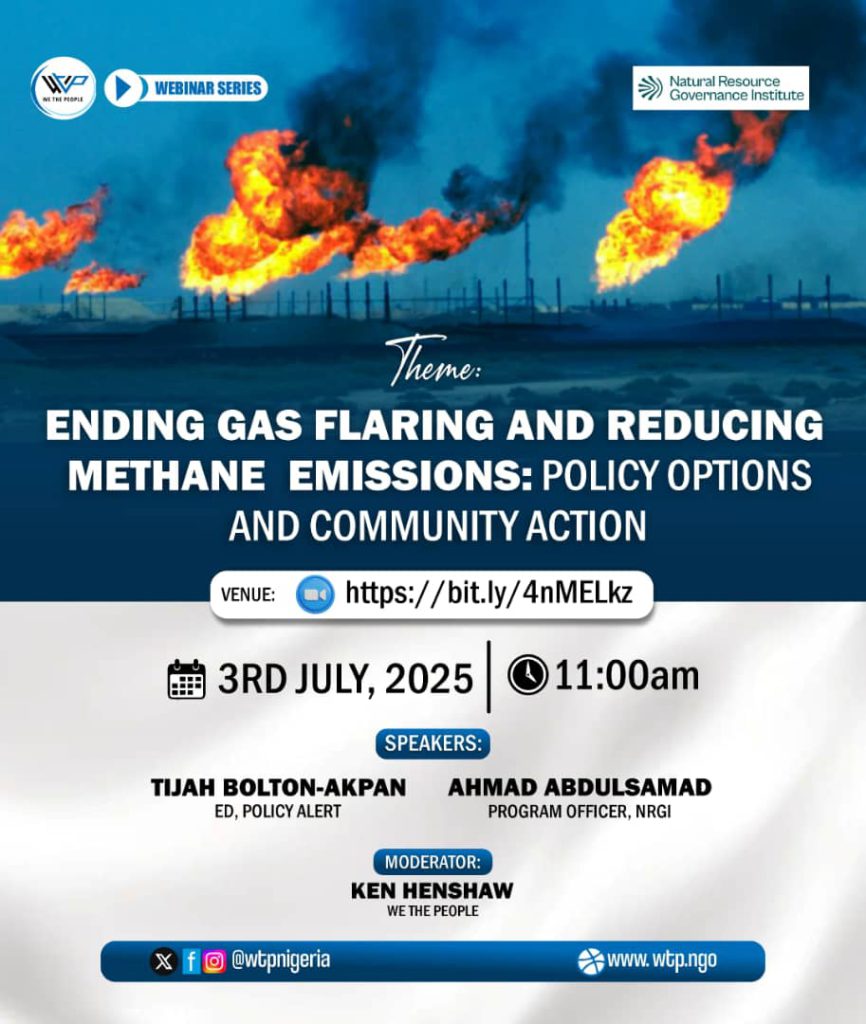By Jonathan Ugbal
Nigeria currently risks exposure to steep carbon tariffs and non-tariff barriers that will impact its energy trade significantly over failure to meet the European Union’s, EU standards on reporting and reduction strategies for methane emissions and ending gas flaring, experts said last weekend.
The disclosure was made by Ahmad Abdulsamad, the programs officer at the Natural Resource Governance Institute, NRGI during a webinar aimed at bringing together policy analysts, civil society leaders, and community advocates to examine Nigeria’s efforts to curb methane emissions and end routine gas flaring, in line with international climate commitments and local development priorities.
Organized by We The People, Center for Social Studies and Development in collaboration with NRGI, the webinar had “Ending Gas Flaring and Reducing Methane Emissions: Policy Options and Community Action,” as its theme, with speakers emphasizing the devastating impact of methane emissions on local communities, including health problems and environmental degradation as well as calling for a shift from technical statistics to human-centered storytelling to better communicate the urgency of the issue.
On his part, Mr. Ahmad averred that emissions’ data in Nigeria are largely self-reported by operators, a scenario which contradicts the EU’s demand for independent verification and transparency, thereby, undermining Nigeria’s credibility, and leaving the country at risk of being shut out of key markets.
Referencing Nigeria’s commitment to the Global Methane Pledge, which calls for at least a 30% reduction in methane emissions by 2030, he posited that while some domestic measures such as penalties issued by the Nigerian Upstream Petroleum Regulatory Commission, NUPRC and Nigeria’s Nationally Determined Contributions, NDCs signalled progress, there is a need for these efforts to be translated into enforceable laws.
He argues that domesticating the Global Methane Pledge, would ensure better compliance and enable regulators to hold operators accountable. Also, he criticized the federal government’s approach of making ambitious declarations without revealing clear methods for implementation. He highlighted a paradox in Nigeria’s strategy, where efforts to reduce methane emissions are being undermined by simultaneous plans to increase gas output.
READ: INSIGHT: Nigeria’s First Oil Emissions Report Reveals Gaps As Only 15 Of 62 Firms Disclose Data
For Tijah-Bolton Akpan, the Executive Director of Policy Alert, the inconsistency in government messaging remains a problem. In his presentation focused on the legal frameworks governing Nigeria’s oil and gas sector and their limitations in curbing methane emissions, he disclosed that the Petroleum Industry Act, PIA allows gas flaring with ministerial approval despite it being declared illegal – a loophole he posited, gives oil companies the flexibility to continue gas flaring indefinitely.
Mr. Akpan drew the attention of attendees to the NEITI Act of 2007, and charged Nigerians, especially the media, civil society organizations, and others to utilize the Freedom of Information Act to demand operational and financial disclosures from companies in the sector as well as hold government agencies and publicly funded entities like the Nigerian National Petroleum Corporation Limited, NNPCL, accountable.
According to him, the legislature and the Nigeria Extractive Industries Transparency Initiative, NEITI also have vital roles in pushing for methane emission reporting that meets global standards.
On the ongoing divestment by International Oil Companies, IOCs which Mr, Akpan described as “a deliberate attempt to transfer environmental responsibility and legacy pollution onto local companies,” he criticized IOCs for creating heavy carbon footprints and now leaving the cleanup to others, all while publicly claiming improved environmental performance.

Other attendees echoed the need for stronger actions while raising concerns over poor data collection, validation of methane emission data, and the health implications of methane exposure.
They called for comprehensive legal reforms, stricter penalties for non-compliance, and continued public advocacy to end gas flaring and reduce methane emissions in Nigeria, with the media urged to do more for indigenous communities demanding action to protect their rights and the environment.
Furthermore, attendees renewed their commitments to advancing public advocacy and continuing dialogue on ending gas flaring and reducing methane emissions in Nigeria.